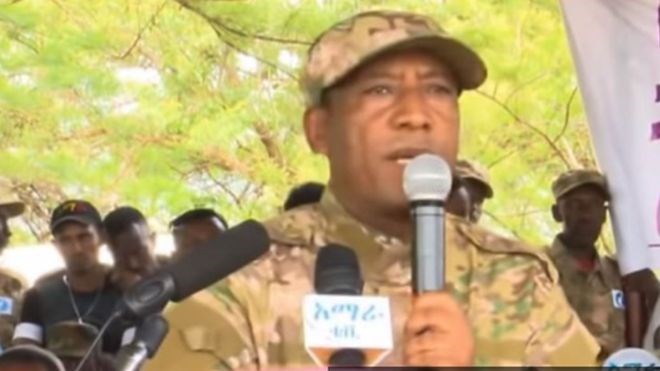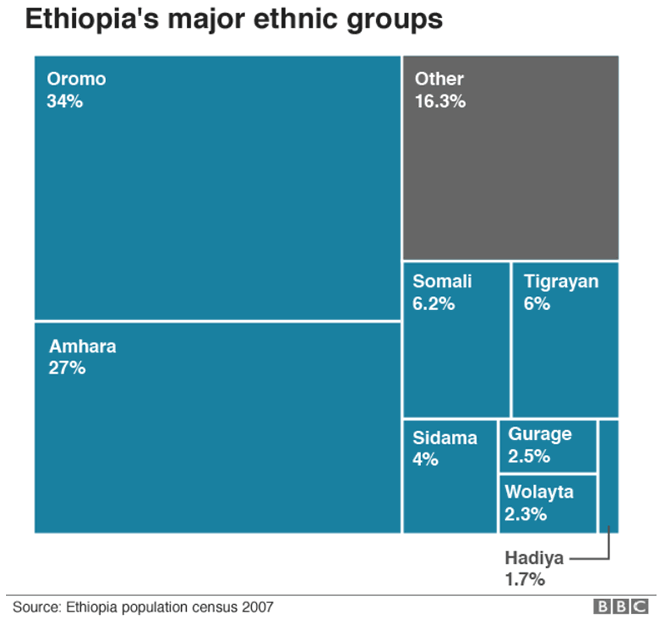
Monday June 24, 2019

The renegade general was released from prison last year
The suspected ringleader of Saturday's failed coup attempt in Ethiopia's Amhara region has been shot dead by police, state media report.
Brig-Gen Asaminew Tsige was killed on the outskirts of Amhara's capital, Bahir Dar, the reports added.
Ethiopia's army chief Gen Seare Mekonnen was killed while trying to foil the coup, the government said.
Prime Minister Abiy Ahmed has urged Ethiopians to unite against "evil" forces set on dividing the country.
Flags are flying at half-mast after he declared a day of mourning to mark the deaths of loyalists.
A heavy contingent of pro-government forces has been deployed in Bahir Dar and the federal capital, Addis Ababa.
The internet has been shut across the country, days after services resumed following an unexplained blackout of more than a week.
The US state department has warned its staff in Addis Ababa to stay inside.
Ethnic violence has hit Amhara and other parts of Ethiopia in recent years.
Since his election last year, Mr Abiy has transformed Ethiopia.
He has moved to end political repression by releasing political prisoners, removed bans on opposition political parties, overseen the prosecution of officials accused of human rights abuses and also restored diplomatic relations with Ethiopia's long-time enemy, Eritrea.
Mr Abiy survived a grenade attack at a rally a year ago on Sunday, which killed two people and left more than 100 injured.
Africa's oldest independent country, Ethiopia is also the continent's second most populous after Nigeria, with 102.5 million inhabitants from more than 80 different ethnic groups.
A transfer hub for long-haul air travel, it has one of the fastest-growing economies in the world, but a vast number of young Ethiopians are without work.
Who was the alleged ringleader?
Brig-Gen Asaminew was Amhara's regional security chief. He was among a group of high-ranking military officers released from prison early last year when the previous government moved to free political detainees in response to public pressure.
The general had been in custody for nine years for allegedly plotting a coup.
According to Reuters news agency, Amhara's top officials had convened a meeting on Saturday to discuss attempts by the general to recruit ethnic militias.
Brig-Gen Asaminew openly advised the Amhara people this month to arm themselves, in a video posted on social media.
What do we know about the attacks?
The chief of staff of the Ethiopian army, Gen Seare, was killed on Saturday evening by his bodyguard, the prime minister's press office said.
The bodyguard killed himself immediately afterwards, police said on Monday, contrary to earlier reports that he had been arrested.
Gen Seare was at his residence along with another general, Gezai Abera, who was also killed, the prime minister's press office said.
The government said it had reason to think the attack was linked to the assassination of the governor of Amhara, Mr Ambachew, a few hours earlier in Bahir Dar.
Mr Ambachew was killed at a meeting in his office along with his senior adviser, Ezez Wasie.
The region's attorney general was wounded in the attack, and has since died, state media reports.
The funerals of some of the officials are due to take place on Tuesday.
Lake Ayalew has now been appointed as the region's acting governor.
Many of those involved in the coup attempt are under arrest and operations are in progress to detain others, the PM's press office said.
"The coup attempt in Amhara regional state is against the constitution and is intended to scupper the hard-won peace of the region," it added.
"This illegal attempt should be condemned by all Ethiopians and the federal government has full capacity to overpower this armed group."
A toxic political atmosphere
By Emmanuel Igunza, BBC Africa
These are tumultuous times for Ethiopia and Prime Minister Abiy, who is already facing increased ethnic tensions.
Chief of staff Seare Mekonnen had only served as head of the military for a year having being appointed by Mr Abiy, who made sweeping changes in the security apparatus when he took office last April.
It is clear there is still significant opposition within the military opposed to the PM's style of leadership.
The killing of Amhara's governor is also a big blow for Mr Abiy, who is credited with installing Ambachew Mekonnen in office.
He was a key ally in Amhara, which is itself facing security problems and clamour from some groups for greater autonomy from the central government.
The first general election since Mr Abiy came to power is supposed to be held next year, but it is very hard to see how this will go ahead in a country that is highly polarised. The atmosphere is just too toxic.

Why is Amhara so important?
The homeland of the Amhara ethnic group is the country's second most populous region and has given Ethiopia its state language, Amharic.
Violence between the Amhara and Gumuz ethnic groups left dozens of people dead last month in Amhara and its neighbouring region, Benishangul Gumuz.
Ethnic violence, typically sparked by land disputes, has displaced nearly three million people across Ethiopia.
Another issue the prime minister is having to grapple with is unrest within the military.
In October, he said hundreds of soldiers who marched to his office to demand a pay rise had wanted to kill him.
Mr Abiy has also made enemies for leading a massive crackdown on alleged corruption and human rights abuses in the military, and the intelligence agencies.
More than 60 intelligence and military officials were arrested last year.
They included the former deputy head of the national security agency and the former head of the massive military-run conglomerate, Metals and Engineering Company (Metec).